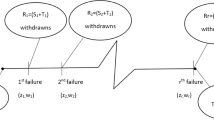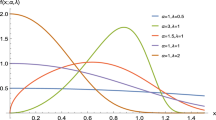Abstract
Process capability indices had been widely used to evaluate the process performance to the continuous improvement of quality and productivity. When the lifetime of products possesses a one-parameter Pareto distribution, the larger-the-better lifetime performance index is considered. The maximum likelihood estimator is used to estimate the lifetime performance index based on the progressive type I interval censored sample. The asymptotic distribution of this estimator is also investigated. We use this estimator to develop the new hypothesis testing algorithmic procedure in the condition of known lower specification limit. Finally, two practical examples are given to illustrate the use of this testing algorithmic procedure to determine whether the process is capable.




Similar content being viewed by others
References
Aggarwala R (2001) Progressive interval censoring: some mathematical results with applications to inference. Commun Stat Theory Methods 30:1921–1935
Anderson DR, Sweeney DJ, Williams TA (1990) Stat Bus Econ. West Publishing Company, Saint Paul
Balakrishnan N, Aggarwala R (2000) Progressive censoring: theory, methods and applications. Birkhäuser, Boston
Epstein B, Sobel M (1953) Life-testing. J Am Stat Assoc 48:486–502
Gail MH, Gastwirth JL (1978) A scale-free goodness of fit test for the exponential distribution based on the Gini statistic. J R Stat Soc B 40:350–357
Hong CW, Wu JW, Cheng CH (2008) Computational procedure of performance assessment of lifetime index of Pareto lifetime businesses based on confidence interval. Appl Soft Comput 8:698–705
Kane VE (1986) Process capability indices. J Qual Technol 18:41–52
Keller G, Warrack B, Bartel H (1994) Statistics for management and economics. Duxbury Press, Belmont, CA
Lee WC, Wu JW, Hong CW (2009) Assessing the lifetime performance index of products with the exponential distribution under progressively type II right censored samples. J Comput Appl Math 231:648–656
Lee HM, Wu JW, Lei CL (2013) Assessing the lifetime performance index of exponential products with step-stress accelerated life-testing data. IEEE Trans Reliab 62:296–304
Meyer PL (1965) Introductory probability and statistical applications. Addison-Wesley, Reading
Montgomery DC (1985) Introduction to statistical quality control. Wiley, New York
Nigm AM, Al-Hussaini E, Jaheen ZF (2003) Bayesian one-sample prediction of future observations under Pareto distribution. Stat Theor Appl Stat 37:527–536
Sanjel D, Balakrishnan N (2008) A Laguerre polynomial approximation for a goodness-of-fit test for exponential distribution based on progressively censored data. J Stat Comput Simul 78:503–513
Tong LI, Chen KS, Chen HT (2002) Statistical testing for assessing the performance of lifetime index of electronic components with exponential distribution. Int J Qual Reliab Manag 19:812–824
Wu SF (2010) Interval estimation for the two-parameter exponential distribution under progressive censoring. Qual Quant 44:181–189
Wu SJ, Lin YP, Chen YJ (2006) Planning step-stress life test with progressively type-I group-censored exponential data. Stat Neerl 60:46–56
Wu SJ, Lin YP, Chen ST (2008) Optimal step-stress test under type I progressive group-censoring with random removals. J Stat Plan Inference 138:817–826
Acknowledgements
The author wish to thank an associate editor and referees for their careful reading and valuable suggestions so that the article is more readable and applicable. The author’s research was supported by The National Science Council NSC101-2118-M-032-003- and Ministry of Science and Technology MOST 103-2118-M-032-004-MY2 and MOST 105-2118-M-032-005-MY2 in Taiwan, ROC.
Author information
Authors and Affiliations
Corresponding author
Rights and permissions
About this article
Cite this article
Wu, SF., Lu, JY. Computational testing algorithmic procedure of assessment for lifetime performance index of Pareto products under progressive type I interval censoring. Comput Stat 32, 647–666 (2017). https://doi.org/10.1007/s00180-017-0717-3
Received:
Accepted:
Published:
Issue Date:
DOI: https://doi.org/10.1007/s00180-017-0717-3




